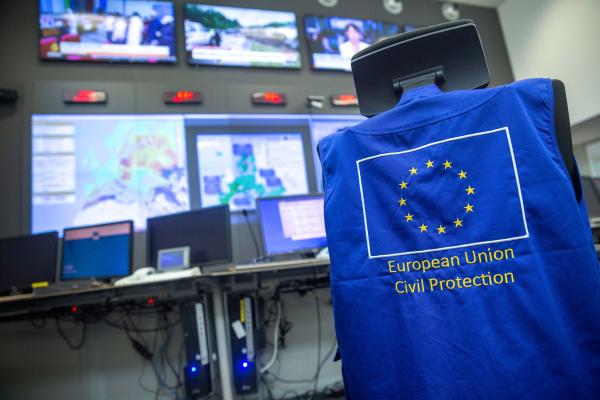The European Union aims to be an area of freedom, security and justice, without internal frontiers. Europeans should feel confident that wherever they move within the EU, their freedom and their security are well protected.
One of the main threats to those aims is terrorism. A menace that does not recognise borders and affects countries and people irrespective of their geographical location.
Individuals and groups should not advance their political aims by using terror, challenge the democratic values of our societies and put in jeopardy the rights and freedoms of our citizens, especially by indiscriminately targeting people. Acts of terrorism are criminal and unjustifiable and must be treated as such under all circumstances.

Prevention of radicalisation includes removing terrorist content online, preventing radicalisation of prison inmates, together with rehabilitation and reintegration, and helping victims of terrorism.

The European Commission supports EU countries in enhancing the protection of citizens and critical infrastructures, especially public spaces, against terrorist threats.

As terrorists and their supporters constantly modify their ways to collect, move and gain access to funds, the EU needs to adapt its instruments and measures to deny them resources.
Combating crime and terrorism

Combating cross-border crime and terrorism is a common European responsibility. EU countries have the front-line responsibility for security, yet EU cooperation is essential to fight terrorism.
While respecting national responsibilities for upholding the law and safeguarding internal security, all relevant EU and national actors need to work together to tackle terrorist threats emanating from home-grown or foreign terrorists, acting alone or in a group and regardless of the ideology that is being pursued by terrorist means.
Special attention should be given to:
- Institutions, which can be the target of hybrid threats by state and non-state actors, through a mix of physical attacks, cyberattacks and disinformation campaigns attempting to radicalise the political narrative.
- Physical and digital infrastructure, delivering a wide variety of services necessary for daily life (e.g. energy, transport, healthcare, finance, etc.) is interconnected. It must be protected and made resilient against both physical and cyber-attacks, which have the potential to cause cascading effects multiplying the initial impact.
2020 Counter-Terrorism Agenda for the EU
On 9 December 2020, the Commission adopted a new Counter-Terrorism Agenda for the EU, setting out a way forward for actions to counter terrorism at EU level, looking to better anticipate, prevent, protect and respond to terrorist threats.
The Counter-Terrorism Agenda is one of the deliverables of the way forward on internal security, a core component of the Security Union Strategy adopted by the Commission in July 2020.
Policy timeline
- 2020EU Security Union Strategy
On 24 July 2020, the European Commission adopted a new EU Security Union Strategy for the period 2020 to 2025. From combatting terrorism and organised crime, to preventing and detecting hybrid threats and increasing the resilience of critical infrastructure, to promoting cybersecurity and fostering research and innovation, the strategy lays out tools and measures to be developed over the next 5 years to ensure security in our physical and digital environment.
One of the four priorities of the Security Union Strategy is “Protecting Europeans from terrorism and organised crime”. The Strategy announces the adoption of a Counter Terrorism Agenda for the EU, together with renewed action to prevent and counter radicalisation.
- 2017Directive on combating terrorism
On 15 March 2017, the EU adopted the Directive on combating terrorism. The Directive reinforces the legal framework to more comprehensively cover conducts related to terrorism. All EU countries have to ensure that they criminalise conduct such as training and travelling for terrorism, as well as terrorist financing. These harmonised definitions of terrorist offences serve as a benchmark for cooperation and information exchange between national authorities.
- 2015European Counter Terrorism Centre (ECTC)
Following the 2015 Charlie Hebdo attack, the Commission proposed in its European Agenda on Security to establish a European Counter Terrorism Centre (ECTC) to improve the exchange of information and the operational support to Member States' investigators. Within Europol, the EU Agency for law enforcement cooperation, the ECTC pools specialised resources, expertise and information on foreign terrorist fighters, explosives, firearms, financial intelligence and online propaganda to support Member States' law enforcement counterterrorism units.
- 2015European Agenda on Security
The adoption of the European Agenda on Security on 28 April 2015, built on the actions undertaken under the previous internal security strategy, thus ensuring consistent and continued action.
- 2005EU Counter Terrorism Strategy
The EU Counter-Terrorism Strategy committed the EU to combating terrorism globally, while respecting human rights and allowing its citizens to live in an area of freedom, security and justice.
Related news items

On 13 December, The European Commission made two announcements that aim to improve security in the EU and to tackle crime. The EU action plan against trafficking in cultural goods and the proposed Regulations to strengthen the use of advance passenger information.

On 7 December Commissioner for Home Affairs, Ylva Johansson hosted the 8th Ministerial Meeting of the EU Internet Forum. The event gathered EU Member states, industry, academia, law enforcement, European agencies and international partners.
Prevention of radicalisation leading to violent extremism and terrorism is a key priority for the EU Member States and the Western Balkan partners.
